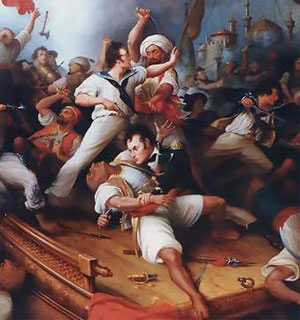
|
| In the summer of 1804, Somers commanded a division of gunboats during five attacks on Tripoli. |
|
Melissa Woods
A
report commissioned by the Somerville Historical Society has declared
Somerville to have a "purely fanciful name," not of any particular
origin. Somerville fire inspector Bob Doherty has ideas of his own,
however-and even better, they have to do with pirates.
The
Blessing of the Bay, the first seaworthy ship built in Massachusetts,
was armed in response to piracy and became, essentially, the first
Coast Guard. Aggressive action needed to be taken against the Barbary
pirates, however, if American ships were to sail in safety. This is
where a young Naval officer named Richard Somers enters the picture.
"Pirating
in Somerville goes way back," muses Doherty. After the Revolutionary
War, American trading ships could no longer fly under the British flag,
nor claim backing by the impressive British navy. The Barbary pirates,
just off the coast of Tripoli (in present-day Libya), then became a
threat.
Born on Somer's Point at Great Egg Harbor, New Jersey,
Richard Somers was one of the first Naval Lieutenants in the then-new
American Navy. Together with his two childhood friends Stephen Decatur
and Charles Stewart, they fought together "like the three musketeers,"
says Doherty, against the Barbary pirates in the summer of 1804. Their
exploits at Tripoli are famously sung in the first line of the Marines'
Hymn: "from the halls of Montezuma to the shores of Tripoli." These
three friends protected the U.S.S. Constitution in equal parts,
commanding six small gunships apiece around the heavy frigate as if it
were "a modern aircraft carrier." Somers' performance as captain of the
schooner Nautilus after he arrived in the Mediterranean earned him
promotion to master commandant on May18, 1804. He afterward sailed
alongside Commodore Edward Preble -then of the Constitution-to Tangier,
and then in five attacks on Tripoli, once fighting five Tripolian
vessels at once at close quarters.
"Millions for defense, but
not one cent for tribute," said Thomas Jefferson when he entered
office, in reference to the pirate threat. As that summer of successful
campaigns drew to a close, Somers realized that the Americans had a
chance to squelch the pirates once and for all. Calling for volunteers,
Somers spearheaded a plan to load the fire ship the Intrepid up with
about 15,000 lbs of gunpowder and 200 loaded shells, and sail it into
the pirates' midst under the cover of night. The ship was to be set off
by remote detonation, but because this was so risky a venture, Somers
insisted that none of his volunteers be family men. This proved a wise
decision. The Intrepid sailed, as planned, into Tripoli harbor, but was
discovered before Somers and his men had time to escape. The ship was
detonated as was, killing all aboard, including Somers himself.
"A
fanciful name," exclaims Doherty, "Not on your life!" Richard Somers
was a nationally-known Naval hero whom has spent time on the United
States, the Boston, and had spent the last day of his life on the
Constitution, out of Charlestown harbor. Six ships in the U.S. Navy
have been named the U.S.S. Somers, since. Somerville, New Jersey, is
known to be named after Somers, as wells as Somers, New York and his
birthplace, Somers Point, but there is no hard proof that Somerville,
Massachusetts is the same case. It is unlikely, however, that an area
so dense with history as Greater Boston should have names of no
historical importance in its midst. Bob Doherty, with his argument for
Richard Somers, provides a defiant yet plausible alternate explanation
in the face of what the history books say.
|
Reader Comments